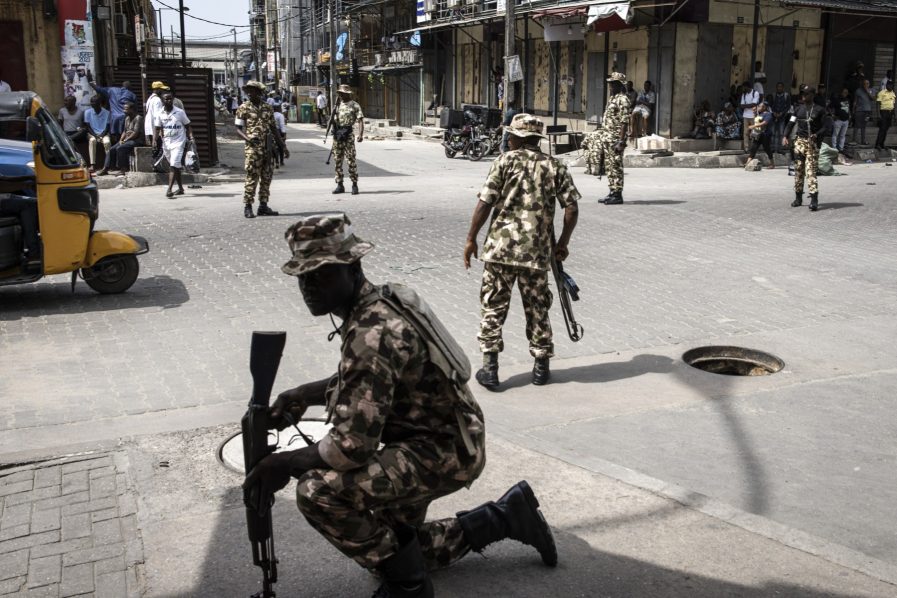
Nearly 90 million were eligible to vote on Saturday for a successor to President Muhammadu Buhari, with many hoping for a new leader to tackle insecurity, economic malaise and widening poverty. (Photo by JOHN WESSELS / AFP)
This is obviously not the best of times for President Bola Tinubu who since assuming office on May 29, 2023 has turned a globetrotter in search of foreign investors.
For records, within his first year in office the president has made at least six foreign trips to countries like France, the United Kingdom, Guinea-Bissau, Kenya, India, the United Arab Emirates, and the United States to woo investors. However, that does not seem to be yielding fruits as statistics from the National Bureau of Statistics (NBS) has shown.
According to the NBS, in the fourth quarter of 2023, the FDI component of the country’s capital importation of $1.1 billion, was $183.97 million representing 16.90 per cent of the total capital importation for that quarter.
But rather than consolidating on what seemed an impressive performance, the FDI in the first quarter of 2024, dropped drastically to $119.18 million or just 3.53 per cent of the total capital importation of $3.37 billion in that quarter. This decline was sustained in the second quarter as the FDI plunged further to a mere $29.83 million or 1.15 per cent of the $2.60 billion total capital imported in the quarter.
Ironically while the president hopped from one country to another in search of foreign investors, those that have already invested in the country were shutting down their operations and exiting the country. At the last count, at least nine multinational companies including Microsoft Nigeria, Total Energies Nigeria, PZ Cussons Nigeria PLC, Kimberly-Clark Nigeria, Sanofi-Aventis Nigeria Ltd, Equinor Nigeria and Diageo PLC, Unilever and Procter & Gamble, have left their on-ground operations since Tinubu took office citing unfriendly business environment.
Nigeria has been having a challenging business environment essentially caused by insecurity, lack of infrastructure, multiple taxation as well as inconsistent government policies, but these were made worse by the economic reforms embarked upon by the Tinubu administration, particularly the removal of fuel subsidy and the floatation of the naira.
Although these policies are receiving commendations from the World Bank, the reality on ground, at least for the moment, shows that they are having a serious negative impact on businesses and the livelihood of the citizens whose purchasing power has been seriously eroded because of skyrocketing inflation.
The Manufacturing Association of Nigeria (MAN) reported that about 767 manufacturing companies shut down operations while 335 others experienced distress in 2023 as a result of various economic difficulties, including exchange rate volatility, rising inflation, and a general worsening of the investment climate.
The fluctuation of the foreign exchange rate and the dwindling value of the naira has made business operations difficult. Multinationals import their raw materials in dollars and also service their dollar debts. They have huge foreign exchange liabilities exposure.
Owing to the sharp depreciation of the naira, profits from Nigerian businesses have become insignificant when compared with others peers. Naira has lost about 70 percent of its value under this administration and averaged N1,511.34/$ at the Investors and Exporters window this year, according to data from the Central Bank of Nigeria.
Just last week, the Chairman and Chief Executive Officer of JP Morgan, Mr. Jamie Dimon noted that countries, including Nigeria, seeking foreign direct investments should ensure consistency in their regulatory framework.
Dimon who spoke at the just concluded 30th edition of the Nigerian Economic Summit held in Abuja, said there’s no mystery about attracting foreign direct investment. According to him, “You know, capital goes to where it’s taken care of, where people think they can make some money and have a return on the capital in the long run.“
The Lead Director, Centre for Social Justice (CSJ), Barr. Eze Onyekpere said no investor wants to get caught in an unstable macroeconomic environment with very high inflation, slow growth and high unemployment.
He noted that investors are attracted into a country by a number of factors which are encapsulated in the ease of doing business.
According to him, “Nigeria’s infrastructure in terms of roads, electricity, water, etc., are deficient.
“There is also the absence of clear rule of law standards for business conflict resolution.
“A country where cases stay interminably in the courts and the judiciary has developed a reputation for subverting the rule of law cannot be a haven for foreign investors.”
He noted that the poor access to foreign exchange to procure raw materials and intermediate supplies for production of goods and services is one of the factors scaring foreign investors.
“The most important of all is the constricted low purchasing power of the majority of citizens who have become multi dimensionally poor under this administration.”
He said a situation where major foreign companies are leaving, local ones are closing or just struggling to survive, is not the right advertisement to attract foreign capital. “It is an advert for capital flight,” he said.
In his own contribution, Professor of Accounting and Financial Development, Lead City University, Ibadan, Professor Godwin Oyedokun, said to attract foreign investors and create a more favourable investment climate in Nigeria, the government must invest in critical infrastructure such as roads, railways, ports, and power supply.
He said the government must also strengthen security across the country to alleviate concerns about safety.
Additionally, he said the government needs to foster a stable political environment through transparent governance and regular dialogue with stakeholders.
According to him, “Reducing political risks can make Nigeria a more attractive destination for investment.”






